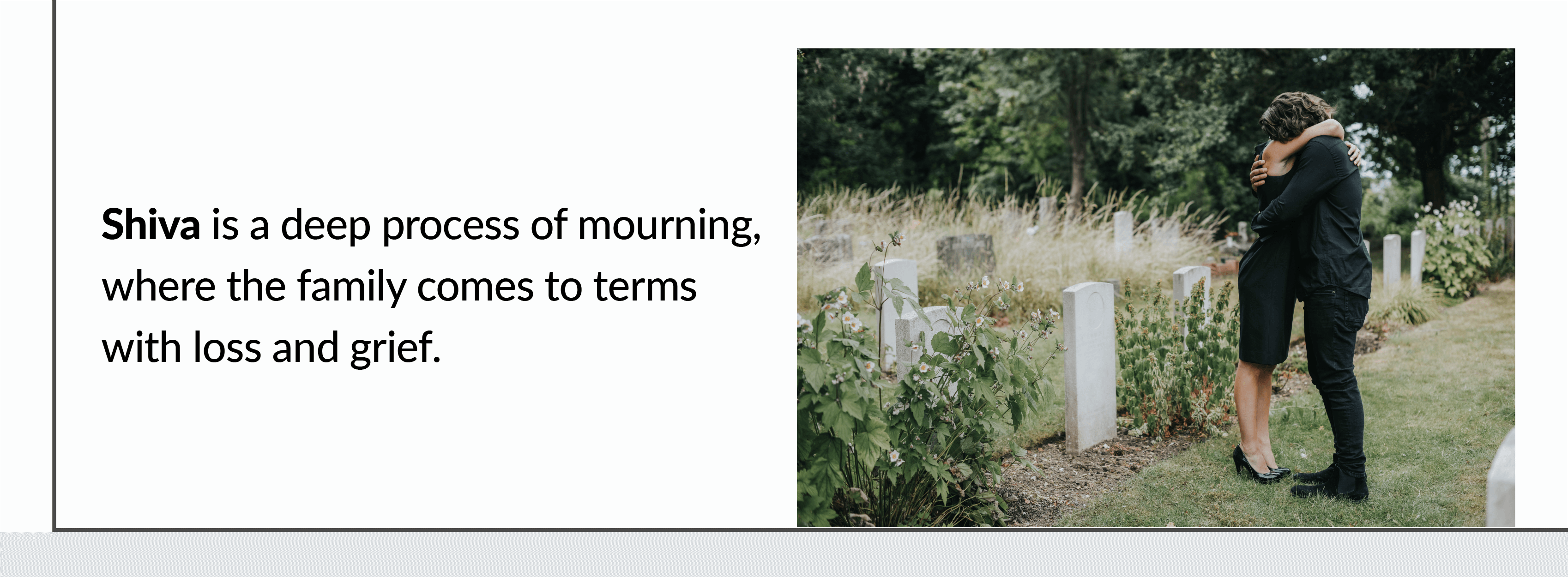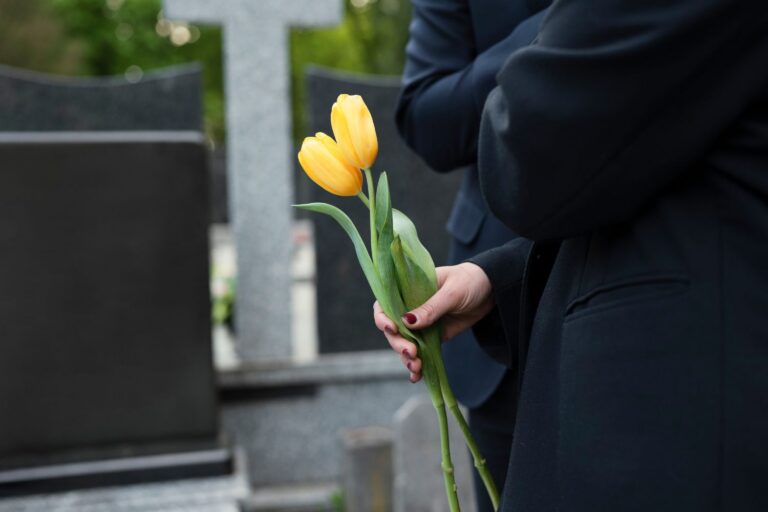Funerals come with unspoken rules, and when they involve a different faith or tradition, it’s easy to feel unsure about what’s appropriate. This is especially true in the U.S.A., the land of equal opportunities and many foreign nationalities under one nation.
Alongside nationality, our country welcomes all religions, including Judaism, each marked by different traditions, holidays, and of course, mourning rituals. One common question that comes up is: Do you send flowers for a Jewish funeral? While flowers are often the go-to gesture of sympathy in many cultures, Jewish mourning traditions follow a different path, one rooted in spirituality and simplicity.
If you’ve never attended a Jewish funeral before or are unsure of what’s expected, you’re not alone. This guide will walk you through the customs around Jewish mourning, what to do (and not do), and thoughtful alternatives to flowers that align with tradition. When someone is grieving, the most meaningful gestures are the ones that honor both their loss and their beliefs.
Also read:
- How to Send Flowers to a Funeral
- Should I Send Flowers to a Celebration of Life Ceremony?
- Which Flowers Last the Longest?
- Best Flowers for Every Occasion

The Role of Flowers in Funerals
Flowers have a quiet way of speaking when words fall short. At funerals, they often carry deep symbolism offering comfort, expressing sorrow, and honoring the memory of a life lost. But the way they’re used, and what they mean, varies greatly from one culture to another.
- A sign of sympathy and support: In many Western cultures, sending flowers is one of the most familiar ways to show you care. White lilies are especially common, they’re seen as symbols of peace, purity, and the soul’s return to innocence. Roses, carnations, and chrysanthemums are also often chosen for their meanings tied to love, remembrance, and grief.
- A reminder of life’s impermanence: In Buddhist traditions, white flowers are typically used at funerals to reflect simplicity and the impermanence of life. There’s beauty in the minimalism, no bold colors, no heavy fragrances. Just a quiet acknowledgment of life’s fleeting nature.
- A celebration of life, not just mourning: In Mexico, during Día de los Muertos, flowers aren’t symbols of loss, they’re a way to welcome spirits back to the world of the living. Marigolds, with their bright gold color and strong scent, are thought to guide loved ones home. Flowers become part of a joyful remembrance, not just grief.
- Cultural and symbolic boundaries: In Chinese funeral traditions, white and yellow chrysanthemums are considered appropriate for mourning, while red, usually linked to luck and joy, is avoided. In Japan as well, white chrysanthemums are strictly reserved for funerals and memorials.
- Acts of reverence: In Eastern Orthodox practices, mourners often place flowers at the casket or gravesite as a personal act of respect and prayer. Carnations, symbolizing admiration and love, are commonly used, as are roses for remembrance and eternity.
While the meaning and style vary, the common thread is this: across the globe, flowers often say what people can’t. As many other things, they become a symbol too, a bridge between grief and beauty, between the living and the memory of those who’ve passed.
Understanding Jewish Funeral Traditions
Jewish funeral customs are rooted in deep respect for the deceased, for the family, and for the sacredness of life itself. The rituals prioritize simplicity, dignity, and community support over decoration or display. If you’re attending or acknowledging a Jewish funeral, understanding the key traditions can help you offer comfort in a way that honors the culture and faith.
- Quick burial: In Jewish tradition, the deceased is typically buried as soon as possible, often within 24 hours. This practice stems from the belief that the soul should be allowed to rest quickly and peacefully. Delaying burial is generally avoided unless there are legal or logistical reasons.
- Simple caskets: The coffin is usually plain and made entirely of wood, without metal parts or embellishments. This simplicity reflects the value of humility and equality in death, regardless of a person’s wealth or status in life.
- Tahara (ritual washing): A chevra kadisha, or sacred burial society, washes and dresses the body in simple white garments (tachrichim) with great care and respect, symbolizing spiritual purity and readiness for burial.
- No open casket: In contrast to some other traditions, Jewish funerals do not include open casket viewings. Modesty and respect for the body are central, and the focus remains on prayer, not appearance.
- Shiva and community mourning: After burial, the family observes shiva, a seven-day mourning period where loved ones gather at home to reflect, pray, and receive visitors. Community support is essential, friends often bring meals, share memories, and sit quietly with the bereaved.
- Minimalism over display: The tone of Jewish funerals is intentionally restrained. Decorative elements, including flowers, are avoided. The emphasis is on spiritual reflection, not outward beauty.
These customs aren’t just traditions, they’re deeply meaningful. Each practice is designed to bring dignity to the deceased and comfort to the living without distraction or excess.
Why Flowers Are Not Sent to Jewish Funerals
Unlike many Western customs, where flowers are a standard part of mourning, Jewish funeral traditions intentionally avoid them. This isn’t an oversight, it’s a choice grounded in religious values, historical context, and cultural beliefs that stretch back thousands of years.
At the heart of Jewish mourning is the concept of kavod ha-met, honoring the dead. That honor comes through simplicity, humility, and spiritual focus. Sending or displaying flowers is seen as a distraction from that intention. While flowers are beautiful and well-meaning, they are also considered ornamental, something that draws attention to the aesthetics of the moment rather than the meaning behind it.
Historically, Jewish communities valued modesty in death, emphasizing that all people, rich or poor, are buried with the same dignity. Lavish floral arrangements were viewed as unnecessary, even inappropriate. When Jewish communities faced hardship or persecution, focusing on humility and spiritual equality became even more central. Extravagance, even in grief, was considered out of step with the values of the faith.
Additionally, Jewish funerals are meant to happen quickly, usually within a day of death. This practical timeline leaves little room for floral deliveries or elaborate planning. The focus shifts to prayer, care for the body, and gathering the community for comfort and reflection.
Even today, in more modern or secular Jewish families, the no-flowers custom is widely upheld. Instead of sending flowers, it’s more appropriate to send a note of condolence, contribute to a charitable cause in the deceased’s name, or bring food to the home during shiva. These gestures are deeply appreciated and more aligned with the cultural and spiritual tone of Jewish mourning.
Understanding this tradition isn’t just about following the rules but showing real respect. When someone passes, the most meaningful thing you can offer is presence, support, and acknowledgment in a way that honors their faith and family.

Appropriate Sympathy Gestures for a Jewish Funeral
If you’re wondering ‘Do you send flowers for a Jewish funeral?’ the answer is usually no, but there are many other thoughtful ways to show you care and support the family. These gestures are more in line with Jewish customs and will be appreciated just as much, if not more:
- Send a condolence card: A heartfelt, handwritten message expressing your sympathy and support goes a long way. Keep it simple, sincere, and free of clichés.
- Make a donation in their memory: It’s customary to contribute to a charity or cause that was meaningful to the deceased or their family. This is a respectful and lasting tribute that aligns with Jewish values.
- Bring or send food to the home: During shiva, mourners often don’t cook for themselves. Sending a meal, especially something easy to serve and reheat, is both practical and kind.
- Send a fruit basket or kosher meal: If you’re not local, you can arrange for delivery through services that offer kosher-certified options. Always check dietary preferences when possible.
- Visit during shiva: Showing up in person (even briefly) during the shiva period can be deeply meaningful. Your presence is often more comforting than words.
- Offer help: Small tasks, like picking up groceries, helping with errands, or watching children, can be incredibly helpful during a time of mourning.
Jewish Mourning Tradition & Shiva
Jewish mourning is a structured, meaningful process designed to help the grieving family transition through loss with the support of their community. While many people wonder whether to send flowers for a Jewish funeral, the tradition centers more around presence, prayer, and simple acts of kindness than visual displays.

After the burial, the immediate family begins a mourning period known as shiva, which lasts for seven days. “Shiva” means “seven” in Hebrew, and during this time, mourners stay home, sit low to the ground (or on low chairs), and receive visits from friends and community members. The atmosphere is quiet, reflective, and supportive, less about conversation and more about being there.
Visitors usually come bearing food or offering help. There’s no pressure for small talk. The focus is on being present, sharing memories, and acknowledging the loss. A short prayer service may be held daily, often led by a rabbi or a member of the community.
Other customs include:
- Covering mirrors in the home to remove focus on appearance.
- Lighting a memorial candle that burns for the full seven days.
- Wearing a torn black ribbon or clothing item (called keriah) to symbolize grief.
- Refraining from celebrations or entertainment during mourning (including TV, radio, and Internet).
Shiva can be shortened if needed, especially when practical or personal circumstances require it, but the core idea remains: mourners are surrounded by support, and the community makes the effort to carry some of that emotional weight with them.
This framework of mourning is not just tradition, it’s a way of healing. Every custom, from sitting shiva to skipping flowers, is designed to honor the dead and support the living in the most human, grounded way possible.
Tips for Respecting Jewish Mourning Customs
Being thoughtful is more than enough, you don’t need to know every detail of Jewish tradition to show respect. These simple guidelines can help you offer comfort without overstepping:
- Dress modestly and conservatively when attending a service or shiva.
- Avoid loud greetings; a quiet “I’m so sorry for your loss” is often best.
- Turn off your phone and avoid taking photos or videos.
- Don’t bring flowers to the funeral or shiva unless you’re certain they’re welcome (or it’s best to ask first, or don’t bring them at all).
- When in doubt, listen more than you speak, your presence means more than perfect words.
These small gestures show care, humility, and respect, which deeply matter in Jewish mourning customs.Whether you’re attending in person or sending support from afar, it’s not about grand displays, but about showing up in a way that honors both the family and their traditions. And if you’re still wondering, ‘Do you send flowers for a Jewish funeral?’ the answer is no, because the most meaningful gestures are rooted in understanding, not appearance.





